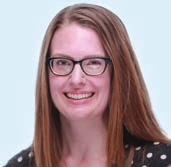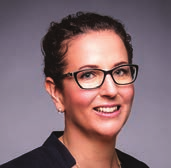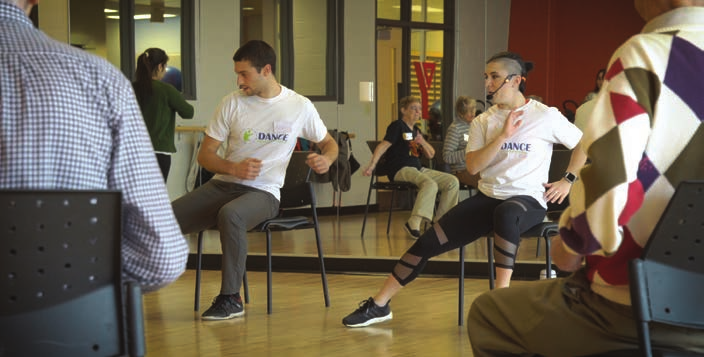Details of Your DNA
In the last two decades, genetic testing has become a household term. Millions around the world have submitted samples of saliva or blood to learn the details hidden in their DNA. Many are simply curious about where they come from and who their ancestors are. But for others, genetic testing can be a matter of life and death, raising difficult decisions about how best to prevent illness and avoid health risk.
As a genetic counsellor, Cynthia Handford ('02 BSc, '05 MSc) knows all too well the tough decisions patients have to make when results come back from a genetic test.
Genetic counsellors: the next generation
Since 2011, the Faculty of Science, along with the Department of Medical Genetics, has offered a senior undergraduate course on genetic counselling. Taught by Heather McDermid (biological sciences) and Sajid Merchant (medical genetics), it provides undergraduate students interested in becoming genetic counsellors an opportunity to gain practical knowledge and observe patient sessions, prerequisites for most master's programs.
"We provide these students insights into the varied roles genetic counsellors have by having students prepare for actual genetic counselling sessions in the clinic," McDermid explains.
"We generally see patients before the test, educate them on what they might expect, then meet with them after test results to focus on what was found and how to interpret the results in context of the family history," she explains. "So if they test positive for a mutation like BRCA1, where the risk of breast and ovarian cancer is quite high, then we focus on understanding what those risks are and the options of how to deal with the risks."
Handford can trace her connection to genetic counselling back to her high school days. "I remember doing a career search in the area of molecular genetics so I could show my dad I could get a job with a bachelor of science-and genetic counsellor kept popping up." She must have been convincing, as she started her bachelor's degree in honors molecular genetics shortly thereafter. Handford went on to complete two master's degrees, one in microbiology and biotechnology and another in genetic testing.
After years working as a genetic counsellor in Edmonton, Handford headed south to California to work for Color Genomics, a company that provides genetic testing for common hereditary cancers and heart conditions. As a patient advocate, Handford walks patients through testing options, explaining what results they might expect, and helping them use the results as part of their health-care decision making.
The role of genetic counsellors has expanded over the years, Handford notes. With roots dating back to the 1970s, when the practice was mainly centred on prenatal testing, today's genetic testing plays a larger role in health care, for both prevention and treatment. Now it means understanding risks for inherited heart conditions, high cholesterol, and newborn metabolic disorders, to name a few.
Today's genetic testing plays a larger role in health care, for both prevention and treatment.
"While I work mostly with families that are concerned about whether there might be a genetic component to cancer in their family, genetic counsellors are now moving into the research laboratory setting or working to provide information and reports for the public."
Interested in exploring different models of how hospitals and companies are trying to meet the needs of cancer counselling services, Handford is now moving to Seattle to join the team at the Seattle Cancer Care Alliance, which unites the leading research teams and cancer specialists of Fred Hutch, Seattle Children's, and University of Washington School of Medicine.
"Cancer genetics in a hospital setting means we see patients, and it has a research component as well," she notes. "This brings me back to some of my university days and the fantastic training I had while in the molecular genetics program that has helped me to understand molecular techniques and to have a strong foundation in scientific literacy."
Aging Gracefully
Courtney Kennedy ('98 BSc) is passionate about aging-an area of increasing importance as our population grows older. Her focus? Helping seniors function independently, leaving them feeling happy and productive into the later years of life.
The associate scientific director of the Geriatric Education and Research in Aging Sciences (GERAS) Centre for Aging Research at McMaster University, Kennedy brings a unique mix of gerontology, clinical epidemiology, and implementation science to her role.
Frailty and dementia are among some of our most pressing health-care problems. According to Statistics Canada, the number of people aged 85 and older grew by 19.4 per cent between 2011 and 2016, nearly four times the rate for the overall Canadian population.
"Mind-body activation is key, which includes physical, mental, and social stimulation," she says. "I am most passionate about helping seniors who have mobility or cognitive challenges to engage as fully as possible in their lives. I would love to see high-quality programs on every corner-part of what we are doing with DANCE."
DANCE is the DANcing for Cognition and Exercise study, which looked at how dance could improve cognition, mobility, and social interaction for at- risk seniors with cognitive and physical challenges. Initially funded as a pilot project through McMaster University, the six-month program included input from dancers, rehabilitation therapists, and geriatricians with the goal of bringing a high-quality, engaging program to where the seniors were.
"They loved it," says Kennedy. "We kept getting asked if we would put it on again," which is exactly what she plans on doing. Along with geriatrician Alexandra Papaioannou and occupational therapist Patricia Hewston, Kennedy and the GERAS team have secured additional funding from a Centre for Aging and Brain Health Innovation grant to build an implementation study based on the DANCE pilot. "We can now take this concept and roll it out in a wider format," she explains. "We have partnered with the YMCA and will be introducing it to 12 sites in the Halton, Hamilton, and Niagara regions in the next year, with the first three sites launching in November."
"I am most passionate about helping seniors who have mobility or cognitive challenges to engage as fully as possible in their lives."
If Kennedy had her way, she would have DANCE in every community hall at least once a week, so seniors could easily access programming nearby. She recalls one man who was in the pilot DANCE program with his wife. At almost 90, he is highly active as a swim coach as well as the primary caregiver to his wife, who has dementia. It is people like this, who strive to keep engaged at any age, that inspire Kennedy to continue her research.
As part of her PhD, Kennedy also worked with computing scientists to develop the Fit-Frailty App, an easy-to-use tool that helps patients, caregivers, and health-care professionals assess the risk of adverse events, like falls, and consider interventions. The Fit-Frailty App was a project recipient of the 2018 Hamilton Health Sciences Foundation Gala and, with funding from the Spark Program, Phase 2 is underway.
"We can now take this grassroots idea and prototype and make into real-world application," Kennedy explains. "This next phase will be to make it better, to test with seniors, to look at the interface and how they are interacting with it."
Frailty and dementia are among some of our most pressing health-care problems. According to Statistics Canada, the number of people aged 85 and older grew by 19.4% between 2011 and 2016, nearly four times the rate for the overall Canadian population.
And while her University of Alberta days are long past, she credits her passion for research to her early undergraduate days. "I still think fondly of my days at the U of A," she recalls. "That is where I was exposed to unique learning and research opportunities. I even published a paper in my final year of undergrad. I love the campus, and because I drank so much coffee there, I still think it is the best campus for great coffee spots."


